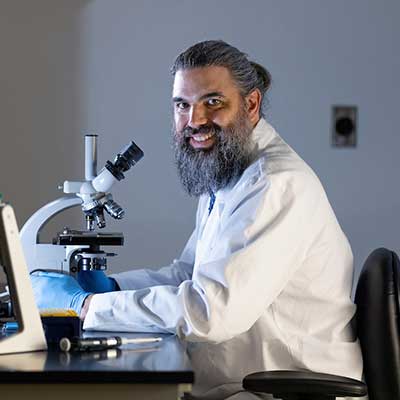
Timothy Casselli, PhD
Biography
Timothy Casselli, PhD joined the Department of Microbiology and Immunology at the Whiddon College of Medicine as an assistant professor. He received his Baccalaureate degree from the University of Western Ontario (now Western University), his Masters' degree from the University of Calgary, and his Ph.D. from Washington State University. He received his post-doctoral training at the University of North Dakota. Dr. Casselli's research focuses on host-microbe interactions and mechanisms of pathogenesis during bacterial infections, specifically studying Lyme disease.
Research
Host-Pathogen Interactions and Immunopathology during Lyme Disease
Lyme disease (LD), caused by infection with the spirochete Borrelia burgdorferi (Bb), has an incidence approaching 500,000 cases resulting in total direct medical costs of ~$1 billion per year in the USA. LD is a multisystem disease that causes localized inflammatory pathologies including arthritis, carditis, and neurological complications. Neurologic disease, referred to as Lyme neuroborreliosis (LNB) affects 10-20% of patients in the USA. Manifestations of LNB can include meningitis, nerve dysfunction, and behavioral changes affecting mood, cognition, and sleep/fatigue. Further, up to 20% of patients that receive appropriate antibiotic treatment develop Post-Treatment Lyme Disease Syndrome (PTLDS), a condition of continuing symptoms after resolution of infection that may have an autoimmune component. The Casselli lab seeks to understand the tissue-specific mechanisms of bacterial invasion and infection-induced inflammation, with a focus on the central nervous system (CNS). Using a combination of bacterial genetics as well as in vitro and in vivo models of Lyme disease, the aims of the Casselli lab include:
1) Risk factor identification: Why do some patients develop LNB while most do not?
2) Biomarker identification: There is an urgent need for a reliable non-invasive test for diagnosing LNB.
3) Characterization of pathologic immune mechanisms relevant to PTLDS.
The overall goal of these aims is to identify factors that can be exploited to develop
novel disease prevention and management strategies for neurologic Lyme disease. Towards
this goal, ongoing projects in the Casselli lab include:
Mechanisms of Acute Lyme Neuroborreliosis
Importantly, the ability of Bb to colonize a particular tissue and the resulting inflammatory
pathologies are dependent on specific interactions between the host and pathogen within
the local microenvironment. Understanding the molecular mechanisms relevant to early
CNS invasion is therefore essential for identifying risk factors for LNB, and could
reveal novel biomarkers and disease management strategies. Epidemiologic evidence
suggests that some isolates of Bb are more neuroinvasive than others. Genetic differences
between Bb strains cannot fully account for the observed heterogeneity in disease
manifestations, suggesting host factors are also involved. The Casselli lab has successfully
modelled this disease heterogeneity in laboratory models of LNB, and is currently
working to identify the specific bacterial and host factors that impact neuroinvasiveness
and downstream inflammation during active Bb infection.
Mechanisms of Antibiotic-Refractory Lyme Neuroborreliosis
Antibiotic-refractory Lyme arthritis is frequently accompanied by autoimmune responses
against tissue repair proteins that accumulate in joint tissue during infection. Likewise,
studies from the Casselli lab show localized vascular damage and disruption of processes
involved in tissue repair in the meninges of Bb-infected mice, which could have autoimmune
consequences against proteins released in the damaged tissue. Tissue-specific inflammatory
pathology is influenced by the local T cell response to Bb in joints and heart tissue,
however little is known about the role of local adaptive immune responses during LNB.
Using laboratory models of PTLDS, the Casselli lab is seeking to identify dysregulated
cytokine responses as well as Bb-derived antigens and host-derived autoantigens associated
with meningeal pathology, with a focus on those overrepresented in other neurologic
or autoimmune diseases.
Other Research Interests
In addition to questions about host-pathogen interactions in the context of mammalian infection, the Casselli lab is also interested in more basic molecular-focused projects on the biology of Bb, including genome modification systems and mechanisms of gene expression regulation.


